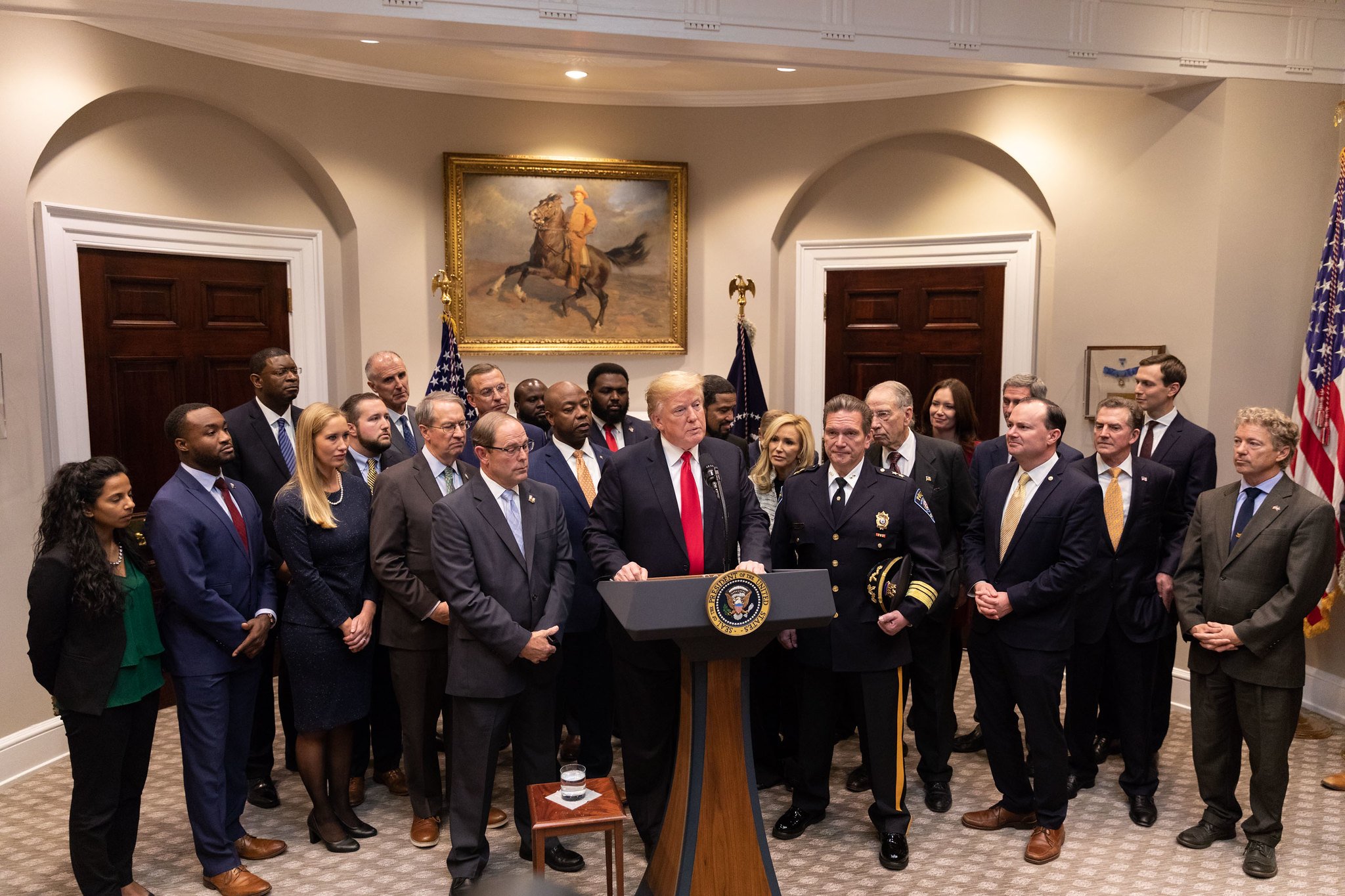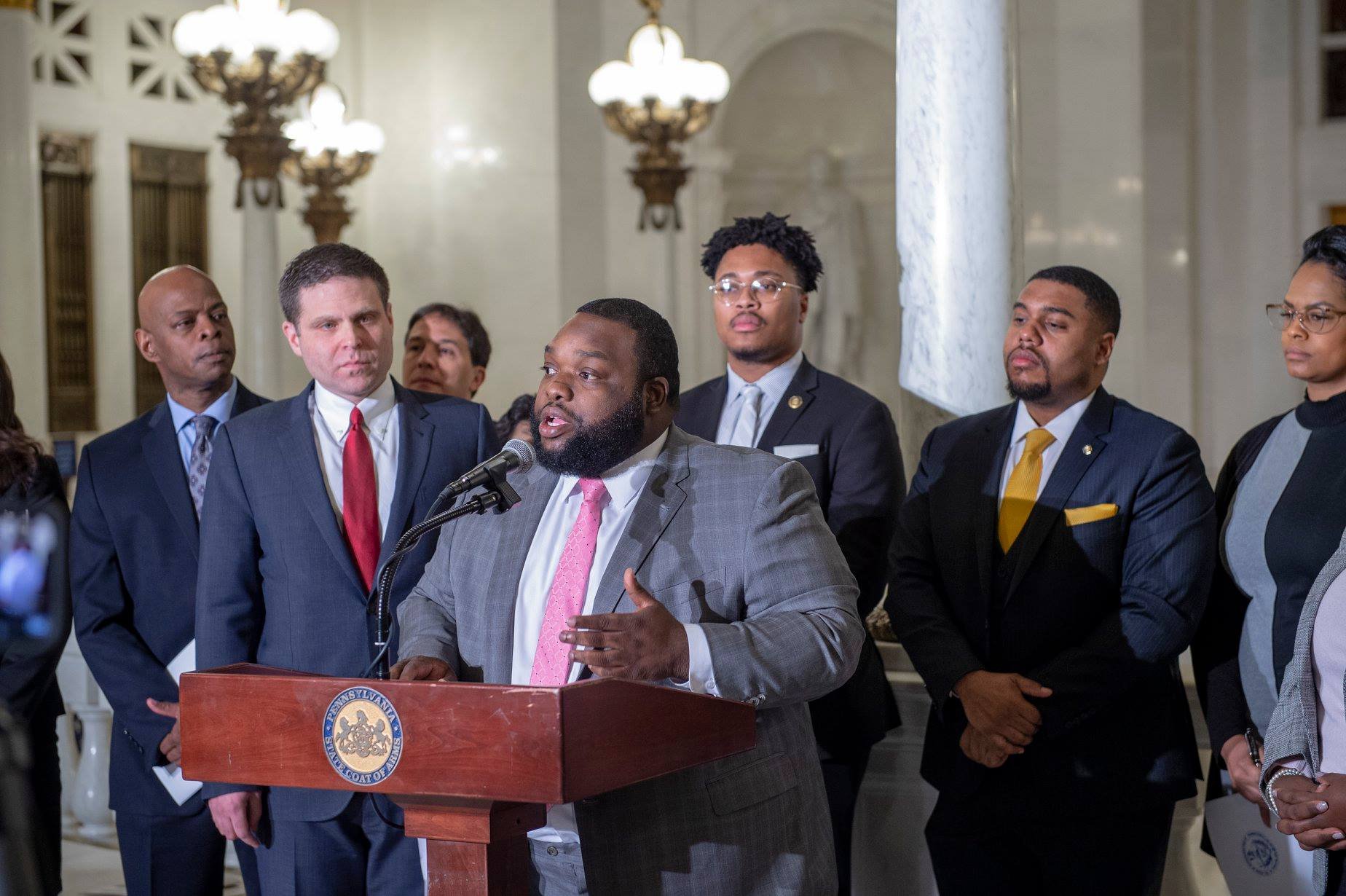 President Trump announcing the First Step Act at the White House
President Trump announcing the First Step Act at the White House
A president besieged from the outset of his presidency relished in a rare legislative victory.
What the White House, Congress, and advocacy groups accomplished in pushing the First Step Act, billed as a major criminal justice bill, over the finish line was “groundbreaking” and “historic,” Trump said.
“Nobody thought they could do it,” he said. “And we got it done.”
For all of the president’s bluster and hyperbolic tendencies, he was correct about one thing: Enough Republicans and Democrats supported the bill for it to earn passage in a deeply partisan and recalcitrant Congress.
The First Step Act, meant to promote early release for federal inmates, marks a significant shift for a nation still grappling with the consequences a generation of tough-on-crime policies that have fueled mass incarceration.
Currently, more than 2.3 million people are incarcerated in the United States, and 10 million cycle in and out jail each year, according to the Prison Policy Initiative, a nonprofit and non-partisan research organization. The majority of people in local jails are being held without bail or simply can’t afford it. And of course, there’s the racial discrepancy, as African Americans are imprisoned five times higher than their white counterparts.
While this movement has been simmering over the last decade amid increased scrutiny on policing and racial injustices, it appears to be gaining steam.
2019 has been a particularly prolific period in terms of laws being passed and bills proposed. In this legislative session alone, officials in New York, Nevada, New Mexico, Colorado, Oregon, Connecticut, Oklahoma and Missouri, among other states and municipalities, passed reform-inspired laws. Democratic presidential hopefuls on the campaign circuit have also been outspoken, reigniting debates over President Bill Clinton's 1994 crime bill and proposing new measures to attack the issue in 2020 and beyond.
The degree to which the First Step Act and similar measures being debated across America will actually reverse decades of over-incarceration is another issue entirely.
“These are really good reforms,” Rachel Barkow, a law professor and faculty director at NYU’s Center on the Administration of Criminal Law, tells News Beat. “But there's no way they'll get us out of mass incarceration.”
Listen to "California: Epicenter of Criminal Justice Reform"
The list of experts and organizations echoing Barkow's analysis is long.
Nicole Porter is the director of advocacy at The Sentencing Project, where she focuses heavily on state and local sentencing reform. Porter, who has been tracking legislative action since 2004, says the scope of the policies doesn’t yet match the rhetorical calls for change coming from many lawmakers.
“Unless lawmakers are willing to go there and are willing to be courageous in their policymaking and their legal reform,” she says, “these changes will be modest and they will certainly not meet the scale and the spirit of what needs to happen to move the country in the direction that it needs to be moved into.”
STATES TAKE ACTION
Most state legislatures will recess soon for the remainder of summer. While there’s a chance some may make a last-ditch effort at more reforms, it’s more likely they’ll have to wait for the fall or even next year.
With the knowledge that further reforms may be politically palatable, advocates are digging in their heels.
New York, where Democrats recently regained full control of the capital, passed a trio of laws, including bail and prosecutorial reforms. Colorado addressed parole and changed laws around drug possession. Oregon made changes to its juvenile justice system. (San Francisco is shuttering its juvenile justice center entirely.) And in New Mexico, the state legislature approved a bill allowing people with past convictions to petition to get their records expunged.
Janos Marton, state campaigns manager for the ACLU Campaign for Smart Justice, agrees more needs to be done. At the same time, he acknowledges that many of these initiatives, in some cases years in the making, will ultimately affect a lot of lives.
He singled out Connecticut’s prosecutorial transparency law, which effectively makes public key decisions made by the local district attorney's office, including charges, bail requests, sentencing, and plea bargains.
“Prosecutors hold people’s lives and fates in their hands, yet Connecticut residents have very little information about prosecutors’ decisions,” ACLU of Connecticut Smart Justice field organizer Gus Marks-Hamilton said earlier this month, cheering the unanimous vote by the state legislature. “This bill’s passage is a step forward for transparency about prosecutors’ actions, and the information it will unveil is vital for ending inequities and injustices in Connecticut’s justice system.”
Oregon, too, made strides, says Marton. Because of a voter-approved measure called Measure 11, passed in 1994, teens 15 to 17 years old charged with specific crimes were automatically charged as adults. A law passed in May amends that provision, requiring prosecutors to hold a hearing to determine whether a juvenile goes to adult court.
“I would say that 2019 has been an encouraging year,” Marton tells News Beat. “For two reasons: One, it does seem like quote ‘blue states,’ these liberal states in the Northeast and West Coast, have generally consolidated political support behind significant criminal justice reform, in some cases passing modest reforms, but in other cases, passing really real transformative bills.”
New York Democrats showed they were serious when they loaded three bills into its $175 billion state budget that eliminates bail for most misdemeanors and non-violent felonies, overhauls discovery laws, and ensures a person’s right to a speedy trial.
“That's big. That's going to make a really big difference in the way that prosecutors and defense lawyers interact in New York,” Barkow says of prosecutorial reform. “It's really going to improve those negotiations. It's going to catch cases where someone is innocent more often than under the old regime. It's going to give defendants a better equal playing field status to try to figure out if they should plead guilty.”
TAKING ON A ‘JUGGERNAUT’
Reform-minded elected officials are well aware of the challenges ahead.
“The criminal justice system is huge, it's a juggernaut,” says Pennsylvania state Rep. Jordan Harris, a Democrat from Philadelphia and the caucus’ youngest whip in the state’s history and co-founder of the newly formed Criminal Justice Caucus.
In the last 40 years, Pennsylvania’s prison population has grown 850 percent, while the number of penitentiaries went from seven to more than two dozen, according to the two-century-old Pennsylvania Prison Society.
But since 2012, the state prison population has decreased by 4,223, with 2018 seeing the most significant decline due to the release of more than 1,000 people, according to the Council on State Governments Justice Center.
In an interview with News Beat, Harris cited the Department of Corrections’ $2.4 billion price tag—the third highest line item in the state’s budget—to underscore the scale of its operation. And that doesn’t include the millions that go toward policing and prosecutions.
As Democratic whip, Harris finds himself in a unique position to pursue worthwhile reforms.
Harris and state Rep. Sheryl Delozier, a Republican who represents a rural region 130 miles west of liberal Philadelphia, collaborated to pass the Clean Slate Law last year. The first-of-its-kind law in the country takes effect this summer. It allows people with certain convictions to have their records sealed and ultimately make it easier for them to earn employment.
 Pennsylvania state House Rep. Jordan Harris, the Democratic whip, continues to pursue criminal justice reform, an issue he campaigned on seven years ago. (Photo credit: Jordan Harris / Facebook)
Pennsylvania state House Rep. Jordan Harris, the Democratic whip, continues to pursue criminal justice reform, an issue he campaigned on seven years ago. (Photo credit: Jordan Harris / Facebook)“There are all of the things that are called collateral consequences: inability to get work and inability to get licensed in certain things,” Harris says. “Just a myriad of things that a person who has a conviction now find themselves unable to do.”
An estimated 80,000 people are incarcerated in Pennsylvania on any given day in its jails and prisons. Between 2006 and 2016, the number of people funneled back to prison in Pennsylvania because of parole violations increased by 56 percent, according to the ACLU. Tackling parole and probation is next on Harris’ agenda.
When he and Delozier introduced HB1555, the Smart Probation and Parole Act in late May, he cited a Pennsylvania Department of Corrections study that found nearly one-third of prison beds were taken up by people who violated post-release supervision mandates. In Philadelphia County, Harris adds, half of all inmates are held because of parole and probation violations.
The issue transcends Pennsylvania. Nationally, a quarter of all prison admissions are blamed on minor technical post-supervision violations, such as missing an appointment or failing a drug test, according to a new report from the Council on State Governments Justice Center. The financial burden is enormous, estimated at $9.3 billion annually nationwide, according to the report.
“It makes absolutely no sense,” Harris says. “I mean, if it's a new crime, we understand, yes, you committed a new crime. But if this is just a technical violation, you're waiting for a violation hearing to determine whether you should be out or not. It doesn't make sense.”
Harris is bullish about building political alliances, hoping a coalition can muster enough support to begin making significant headwinds.
“This is not a liberal or conservative issue. This is an issue about people,” he says. “When we spend $2.[4] billion out of our General Fund for the Department of Corrections, $2.[4] billion to keep people in caged rooms, I would much rather spend that on roads and bridges, education or other things in Pennsylvania that we know is a return on our investment.”
The Clean Slate Law, which Harris introduced in the House, passed the state Senate 49-0 before making its way to fellow Democrat Gov. Tom Wolf’s desk last June.
He’s hoping for a repeat with HB1555. The bill already has the backing of seemingly strange bedfellows, including the group Cut50, co-founded by CNN commentator and former Obama advisor Van Jones; Justice Action Network, which includes allied progressive and conservative partners; Reform Alliance, founded by rappers Jay-Z, Meek Mill and others; and the Koch brothers-funded libertarian outfit Americans for Prosperity.
“The whole ‘tough on crime’ thing we know doesn't work,” he says. “It's time for us to become smart on crime. That is a shift that is a political shift, but I think it's one that has to be driven by the public.”
PRISON POPULATIONS ARE DECLINING. BUT NOT BY MUCH
Overall, prison populations have been shrinking, including at federal-level and state facilities. But some states went in the other direction, with 19 actually seeing increases between 2017 and 2018, according to the Vera Institute of Justice.
The greatest reduction in prison incarceration rates occurred in the Northeast, which at 3.3 percent was nearly double the national average of 1.8 percent. When 2018 ended, there were 20,000 fewer people inside state and federal prisons than the previous year, and 144,000 less than in 2009, Vera reported.
These declines are not solely attributable to legislative solutions. A recent analysis by the Brennan Center for Justice found that crime in the 30 largest U.S. cities had fallen in 2018. This follows a Brennan Center report in 2016 that found crime dropped “precipitously” in the last quarter century, after peaking in 1991. Similarly, according to statistics from the Bureau of Justice Statistics, an arm of the Department of Justice, violent and property crimes both declined by more than 20 percent between 2008 and 2015.
Experts are encouraged by the general decline, even if they are straining not to pour cold water on the movement’s recent successes.
In March 2018, The Sentencing Project released a report titled “Can we wait 75 years to cut the prison population in half?” and characterized the current pace of decarceration as “insufficient.”
At the country’s current rate, the projected federal prison and state population, currently just over 1.5 million, wouldn’t be halved until 2093, according to the report.
“Expediting the end of mass incarceration will require accelerating the end of the Drug War and scaling back sentences for serious crimes,” The Sentencing Project said.
Groups like Cut50 and the ACLU, through its Smart Justice Campaign, are calling for steeper declines, much quicker.
As part of its Smart Justice Campaign, the ACLU in September 2018 announced a 50-state blueprint to drastically begin decarcerating, featuring a state-by-state analysis. For example, in Louisiana, the blueprint called for reclassifying drug and property offenses from felonies to misdemeanors, while recommending Pennsylvania overhaul parole and probation. Perhaps more than anything, the blueprint, which now includes nearly three dozen states, suggests a one-size-fits-all approach would be foolhardy.
Marton of the ACLU says blueprints should be available for all 50 states, plus Washington, D.C., by the end of the summer, providing individual stakeholders and lawmakers with a roadmap to reducing incarceration in their respective states by half.
AGGRESSIVE ACTIONS NECESSARY
The politics of criminal justice reform have indeed shifted, but not enough to make it a full-scale rebuke of punitive practices that defined, even to this day, the country’s political system.
The majority of bills proposed and laws passed are originating from state houses under Democratic control.
And while there’s a growing consensus among people of varying political persuasions that the country needs to reverse the cycle of incarceration, Democrats seemingly have a much larger appetite for such change.
Then there’s the matter of the actual solutions being offered. Only reaching for the low-hanging fruit, such as bail and sentencing reform for nonviolent offenses, leaves out some of the leading drivers of incarceration, such as convictions for violent offenses, experts say.
According to the Prison Policy Initiative, 712,000 are in state prisons for “violent” offenses that range from robbery and assault to rape and other sexual crimes, manslaughter, and murder.
One way to aggressively decarcerate, says Barkow, would be through major sentencing reforms, especially for violent offenses.
“Until we can get a political discussion that can really think about how we're going to deal with those kinds of crimes, you’re really just going to see the pace of reform, tinker around the edges of this problem as opposed to kind of get to the heart of it,” Barkow says.
“And that assumes that we continue at the same pace, which seems unlikely because at a certain point you run out of reforms that are politically palatable,” Barkow adds, referring to the 75-year projection to cut the prison population in half.
“And if crime goes up, it'll be really hard to get some things passed," she continues. "So I don't think the reforms we're seeing right now are sufficient for that, for the kind of large-scale reduction in imprisonment. They are not going to come close to that.”
In her most recent book, “Prisoners of Politics,” Barkow argues for taking the politics out of criminal justice-related policy-making and leaning more heavily on experts, as the country does with other governmental institutions.
She points to the Federal Sentencing Commission, an independent, non-partisan government agency that sets federal sentencing guidelines, of which she was a member for six years, until January 2019. In 2016, the Commission amended the definition of “crimes of violence,” removing burglary from the list of violent offenses, a decision based largely on empirical data.
“When we looked at the data and we saw that...97 percent of the cases don't involve any physical violence, we said we should take burglary off the list,” Barkow says. “If you have the rare case where somebody has committed a burglary and someone's been hurt, then the judge can give a harsher sentence. But in the main, we shouldn't treat it like it's a violent offense when it's not.”
The Sentencing Project’s Porter hesitates to frame 2019 as a banner year for reform. Each year, she says, legislatures across the country propose “hundreds if not thousands” of criminal justice-related laws, including those geared toward being tougher on crime.
“In order to substantially reduce the number of people in prison,” she says, “there are significant changes that need to happen."
For Porter, that includes revisiting mandatory minimum sentences and ending life sentences without parole. Such harsh penalties have contributed to the ballooning incarceration rate. The number of people serving life sentences has quadrupled since 1984, surpassing 160,000 in 2016.
Even reducing state prison populations by 25 percent, which Illinois is hoping to accomplish by 2025, would be difficult without considering underlying causes of mass incarceration, she adds.
“Our contention is in order to do that, just focusing on low-level offenses, just focusing on reducing returns to prison for parole and probation revocation, isn't gonna achieve those goals unless states also revisit these very extreme prison terms, like life without parole and virtual life sentences, which we define as being sentenced to 50 years or longer,” Porter continues.
“So until we grapple with that, the unfairness of these very extreme sentences that don't recognize maturity and rehabilitation, we're not going to be meeting these goals. And we're not going to be achieving these rhetorical statements that some policymakers claim that they are supportive of in addressing mass incarceration."










